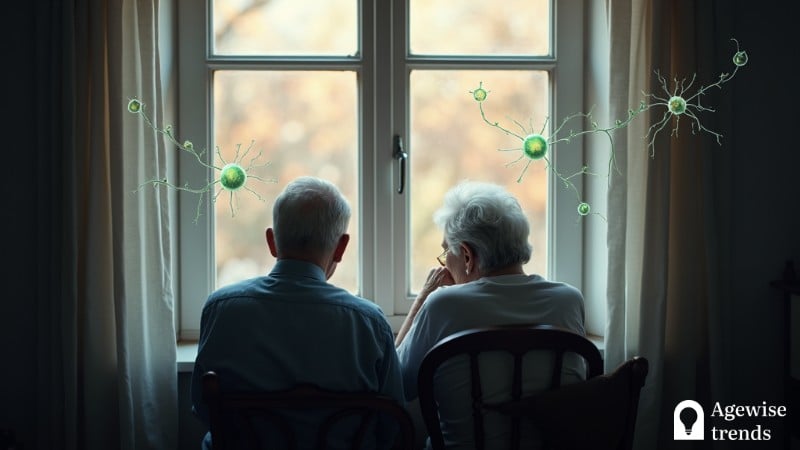Imagine an older adult with early memory loss who also seems withdrawn and sad. Is it a sign of worsening dementia, or is the person suffering from depression – or perhaps both? In seniors with cognitive impairment, memory problems can often mask mood symptoms, and vice versa.
This is concerning because late-life depression can accelerate cognitive decline or even be an early warning sign of dementia. Early detection and treatment of depression in this population is crucial – and that’s where machine learning is making a remarkable difference.
Key Takeaways
Machine learning is helping to accurately diagnose depression in seniors with cognitive impairment by identifying subtle patterns in speech, facial expressions, and daily behavior.
- Machine learning algorithms can predict depression risk in seniors with cognitive impairment with up to 74% accuracy.
- ML models can analyze speech patterns, facial expressions, and daily activity data to detect depression without active patient participation.
- These technologies provide objective assessments that can assist clinicians in early detection and treatment of depression in seniors with cognitive impairment.
When memory loss and mood disorders collide
Diagnosing depression in someone with cognitive impairment is a delicate task. Many symptoms of depression overlap with dementia – for example, apathy, slowed speech, or difficulty concentrating can be attributed to either condition.
Seniors with memory issues may also struggle to communicate their feelings, leading clinicians to miss signs of a mood disorder. Traditional screenings and interviews don’t always catch subtle changes in affect, especially in a patient who might already be confused or anxious.
Machine learning (ML), a branch of artificial intelligence where computer models learn patterns from data, offers a new way to tackle this challenge. By sifting through large amounts of data – from clinical assessments to speech recordings – ML algorithms can uncover hidden patterns associated with depression that doctors might overlook.
In a recent large-scale study, researchers applied ML models to predict depression risk among thousands of older adults, taking into account demographics, health habits, and cognitive test scores. The algorithms (including decision trees and gradient-boosted machines) could modestly predict which seniors were likely to have depressive symptoms, with prediction accuracy measured by an AUC up to around 0.74.
More importantly, the computer identified key risk factors that mirror clinical intuition – poor self-rated health, disrupted sleep, advanced age, and lower cognitive function were the top predictors of depression. Notably, cognition itself emerged as a significant factor: in other words, seniors with worse cognitive scores were more prone to depression.
Algorithms that listen and watch for subtle signs
Some of the most exciting advances come from teaching computers to recognize depression through a person’s voice, facial expressions, and language. Subtle cues in speech – like slower speaking rate, lower volume, or longer pauses – might signal apathy or sadness. Likewise, facial expressions (or lack thereof) can hint at a person’s emotional state.
These signs can be especially telling in cognitively impaired seniors who might not explicitly report feeling depressed. Researchers are harnessing machine learning to analyze such cues with impressive results.
For instance, a team of scientists developed a system to detect depression in older adults with MCI by recording short videos of them speaking. Using a camera and microphone, they captured participants’ speech patterns and facial movements and then fed these into an ML model. The algorithm – a random forest classifier – learned to distinguish depression from other conditions like anxiety and apathy based on these audio-visual features.
The model proved remarkably accurate: in one study of 319 seniors with MCI, it could classify their emotional state with a weighted F1 score of about 96%, and around 87% accuracy in identifying depression correctly. In practical terms, the computer’s judgments closely matched clinical evaluations.
By combining text transcripts, voice tone, and facial expression analysis, the ML system provided an objective assessment of mood that could be used for remote monitoring. This is a game-changer – it means a nursing home or clinic could potentially use a camera and microphone to routinely screen for depression in patients with cognitive impairment, flagging those who need a closer look.
Detecting invisible clues
Beyond clinic visits and interviews, what if we could detect depression in cognitively impaired seniors passively, as they go about their day? Consider sleep and activity patterns: Depression often leads to changes in sleep (like insomnia or excessive sleeping) and decreased physical activity.
In someone with cognitive impairment, these changes might be even more subtle or attributed to their cognitive condition. Machine learning can analyze data from everyday behaviors to spot red flags without any active effort from the senior or intensive input from caregivers.
A cutting-edge example is the HOPE project, which developed an AI model to monitor older adults’ well-being through their home’s Wi-Fi signals. The system uses Wi-Fi motion sensing – essentially, it looks at disruptions in Wi-Fi radio signals caused by a person’s movements at home (no wearables or cameras needed). With this, it can infer the person’s walking activity, sleep duration, and sleep interruptions.
Toward early diagnosis and better care
The convergence of machine learning and geriatric mental health is opening new frontiers in how we care for seniors with cognitive impairment. These intelligent systems do not replace clinicians or caregivers, but they provide powerful support.
They can process vast and complex data – from voice inflections to daily step counts – and highlight patterns that humans might miss. In doing so, ML models act like an ever-vigilant assistant, helping ensure that depression doesn’t go unnoticed behind the veil of dementia or mild cognitive decline.














